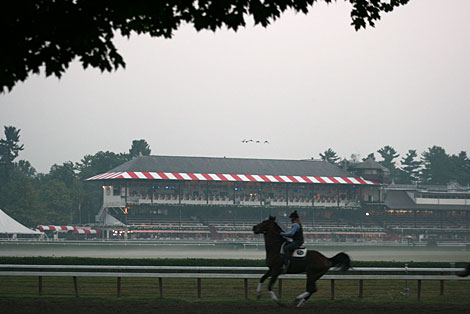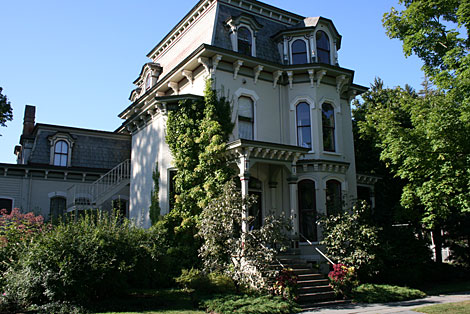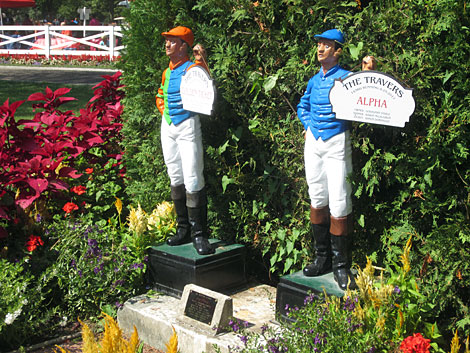by Vic Zast
Once upon a time, a little racecourse with brown wooden stands, a white linen table-clothed dining room and a winner’s circle drawn in chalk stood among the cooling pines of a quaint Victorian city at the edge of the Adirondacks.

The racetrack's red and white trim was added recently, perhaps only 50 years ago.
Gentlemen wore suits to the Clubhouse and waiters tuxedos on the porch where breakfast was served as the horses worked out. There were races each day, except Sundays, and only in August, when the tomatoes and melons were ripe.
Even a $2 better could study a horse up close. In 1953, it was reported that fans swiped souvenir hairs from the great Native Dancer’s tail as the colt walked from the oak under which he was saddled along a path to the track.
Horse racing belonged then to royalty – not the kind that wore crowns but the kind that controlled the world’s economy.
Families rented homes on Fifth Avenue and moved in with their families and staff into mansions on Union Avenue and North Broadway. Women ate watercress sandwiches and sipped ice tea for lunch at the Reading Room and rode there in horse-drawn carriages.

Mansions that rich people rented still stand but many have year-round residents.
The season isn’t like that anymore, even in memory. The feeling you get is that money means more than experience. Saratoga has always been meant as a small plate. That’s when it’s tastiest and does most for the sport it represents. The portion this year got away from the servers. On Saturday, again, the starter called horses to the gate on 11 exhausting occasions.
The gray cover made the Saturday afternoon seem like a Wednesday at Aqueduct. But the crowd was big and enthusiastic. It rained, thundered and blew through the night – so hard that at times the weather woke you. The conditions were sloppy. By 8:00 AM, four or the five turf races, except for the Bernard Baruch Stakes (gr. II), which was won by the favorite Silver Max, were moved to the main track.
Honor Code, a classic-named son of AP Indy that Shug McGaughey had out for exercise, won the fourth race portending greatness. He is bred for the grass and for longer distances. But the Champagne Stakes (gr. I) at a mile on the dirt is next up.
The seven-furlong Forego Stakes (gr. I) was the second of three stakes and perhaps the most uplifting one. Strapping Groom won at 15-1 for Drawing Away Stable and David Jacobson. These were the connections for Saginaw, the popular warrior that was euthanized 24 hours earlier after breaking two bones in a ballyhooed showdown with Caixa Eletronica.
Alpha, one of last season’s two dead-heat Travers (gr.I) winners, caught a break when the California-based Paynter, the favorite determined by emotion and investment, failed to fire as the horses broke. Alpha had the pace to itself and won the $750,000 Woodward Stakes (gr. I) from gate to window, outlasting Flat Out, the choice of the guy who wagered Marylou Whitney and John Hendrickson’s $15,000.

Walking ring after Alpha dead-heated in the Travers.
Once upon a time, Alpha won the Jim Dandy Stakes (gr. II) on a similar sloppy track.
Vic Zast has attended the races at Saratoga for 49 straight summers. His favorite race in all that time was the Woodward won by Rachel Alexandra.




